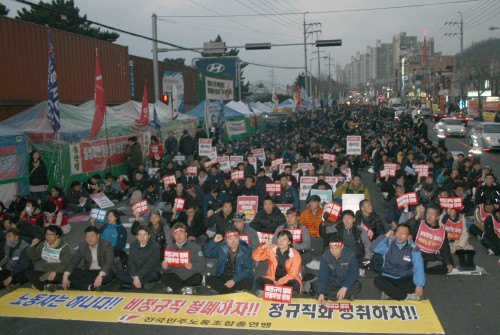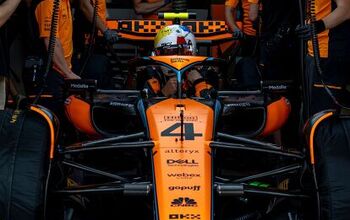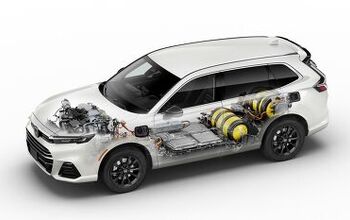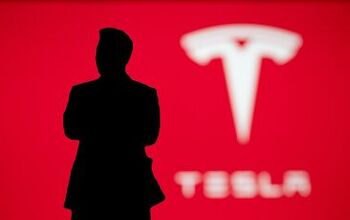UAW Protest Targets Hyundai, Ignores Hypocrisy
Unable to provide meaningful representation to its dwindling membership, the United Auto Workers is continuing its post-bailout strategy of poking its nose into everyone else’s business with a protest planned for today at the Hyundai America Technical Center in Ann Arbor, MI. While its own workers face the aftermath of a bailout that saw tens of US plants shut down, the UAW opines on the Korean situation in a release which notes:
Frustrated by their temporary status, auto workers at a Hyundai Motor Co.mpany plant in Ulsan, South Korea, declared a strike on Nov. 15, and one desperate worker set himself on fire in protest of the company’s refusal to offer secure jobs. About 500 workers have since led an occupation of various plants in the Hyundai compound… To anyone interested in workplace fairness, the resolution of the Ulsan Hyundai workers’ strike is critical. It could either speed up progress toward ensuring global living wages, or provide a green light on the race to the bottom the auto industry began years ago – — with Toyota and Hyundai getting a head start.
One must, however, point out that the UAW has made its fair share of contributions to recent declines in auto worker wages. After all, it forced nearly half of GM’s Orion Assembly plant workforce to take a 40 percent wage cut in order to build a politically-popular fuel-efficient subcompact (the next-gen Aveo) in the US. Not only did this represent an unconscionable screwing of its own union “brothers” but it also directly hurts the Korean workers the UAW now so self-righteously defends by by stealing jobs using the very same “race to the bottom” that it decries. Besides, the labor situation in Korea is a bit more complex than the UAW’s Manichean moralizing makes it out to be…
UAW President Bob King unsurprisingly sees the labor conflict in strictly moral terms, telling his membership:
Precarious [temporary] workers should be treated in the same manner and have the full rights of regular Hyundai workers. The UAW and our sister unions around the globe will be standing with these workers until Hyundai stops the violence and repression of these workers and recognizes them regular Hyundai workers… Hyundai is a very successful, profitable company, and it is a moral outrage that instead of including workers in the success of the company, they are keeping more than 8,000 workers at poverty level wages and in complete uncertainty for themselves and their families. We join the Korean Metal Workers Union in demanding that Hyundai immediately hire these workers as full-time Hyundai employees and ask that all people of conscience join us in this demand
But the Korean protesters aren’t complaining about “poverty level wages,” nor are they anxious to simply join the Korean Metal Worker’s union. In fact, the Korea Times reports that Korean labor law is changing, and that starting next year, workplaces will be able to host multiple unions. As a result,
A growing number of labor unions are breaking away from the radical Korean Confederation of Trade Unions ahead of the implementation of the multiple-unions system next July.
As more labor unions declare their intent to focus more on working conditions rather than political or ideological struggles, critics predicted, competition among labor unions is expected to become fiercer, bringing about a paradigm shift in the nation’s labor culture.
Union members trying to break free from an overly-politicized umbrella union that is more interested in pushing political agendas than helping out workers on the ground… does that sound familiar? Dissatisfied with existing unions, over half the members of the UAW-backed Korean Metal Workers Union (part of the KCTU) predict that new unions will emerge at their workplaces, and nearly half predict that their advent will reduce the number of labor conflicts. Clearly, simply arguing that all Hyundai workers should be accepted into the KMWU makes little sense from the perspective of trying to help Korean workers. It does, however, make perfect sense from the self-serving perspective of the existing unions like the UAW and KMWU/KCTU because this is the last chance to bring temporary workers into the fold ahead of next-summer’s free-for-all. If the KMWU doesn’t recruit Hyundai’s “precarious” workers, they could just start their own union next Summer, creating competition within the unions. This gambit is all the more obvious, considering the reports that
Although the company has conducted three-way talks between the non-regular workers’ union and Hyundai’s union and management, those involved have so far failed to find common ground.
In addition, members of the non-regular workers’ union not taking part in the sit-in strike began a six-day tour of facilities of Hyundai and other companies with non-regular workers to shore up support for their cause on Sunday.
Meanwhile, Hyundai’s losses from the protest have mounted to over $200m, as non-regular workers have blocked production of the new Accent (Verna) and Click (Getz). Clearly Hyundai has plenty of incentives to come to an agreement with the striking workers, but if their (non-regular) union is counter-protesting, and the main unions are simply trying to clutch onto relevance, there’s not much promise of a sustainable long-term deal.
Meanwhile, the UAW’s sense of moral clarity in this confused conflict may be mysterious, but it’s clear where it’s coming from: famed labor consultant Richard Bensinger. In a Freep profile crediting Bensinger with involvement in the UAW’s Hyundai protest, Bensinger is described by colleagues as
“one of the most gifted organizers in American labor,” said Harley Shaiken, a professor of labor relations at the University of California at Berkeley. Bensinger has even earned the respect of Rick Berman, an adviser companies turn to for advice when they battle unions.”He’s probably got a better sense of morality than a lot of guys I have run into in the labor movement,” said Berman, president of Berman and Co. “He’s not one of these guys who thinks people should be pushed into a labor union whether they want to be in one or not.
More by Edward Niedermeyer
Latest Car Reviews
Read moreLatest Product Reviews
Read moreRecent Comments
- Lou_BC Well, I'd be impressed if this was in a ZR2. LOL
- Lou_BC This is my shocked face 😲 Hope formatting doesn't fook this up LOL
- Lou_BC Junior? Would that be a Beta Romeo?
- Lou_BC Gotta fix that formatting problem. What a pile of bullsh!t. Are longer posts costing TTAC money? FOOK
- Lou_BC 1.Honda: 6,334,825 vehicles potentially affected2.Ford: 6,152,6143.Kia America: 3,110,4474.Chrysler: 2,732,3985.General Motors: 2,021,0336.Nissan North America: 1,804,4437.Mercedes-Benz USA: 478,1738.Volkswagen Group of America: 453,7639.BMW of North America: 340,24910.Daimler Trucks North America: 261,959


































Comments
Join the conversation
SCREW the UAW. Hyundai should take notice that these mobsters will be moving in and holding Hyundai hostage here in the USA. Here is some advice Hyundai, pack up everthing and RUN. Get out of that state of Michigan as fast as possible!
I'm with Mikey on this one - two tiered wages are the best solution to the situation. I'm a management side guy who has done extensive labor contract negotiating, and while I don't think that unions often make very good long term deals, I don't hate them. Management gets their share of the blame in all this. They should have taken the strike and held the line. See Catepillar. They held the line back in the 90's to the short-term pain of both sides but the long-term benefit of everyone. However, back to those who say that the union caved by agreeing to two-tier wages. It's all well and good to say that the old guys with mortgages, car payments, kids in school, and level of life-style developed over years should take a pay cut, but it's very bad in the real world. I would agree that wages and benefits have been too generous in the past to the detriment of the company as a whole, but I sure don't want MY wages cut by 20% and I don't think many of you could survive that kind of cut either. Better to do as the union and management agreed, and offer a substantial retirement lure to move the high wage cost guys out of the system. The guy with whom you replace him has the option to take the job for the lower wage or not. He's not taking a pay cut. He's just not getting a job at the wage levels that YOU GUYS have declared outrageous. I really don't see what you're complaining about. Further, I'd point out that so far, the new system seems to be working. GM is turning out some good products, as is Ford, and the UAW guys (in both tiers) are working, and not sitting in some job bank or drawing another 52 weeks of extended unemployment benefit at taxpayer expense.. I do agree that UAW should be working on getting their US house in order and staying out of Korean labor..... this is very much a situation where one union can't represent both sides- U.S. manufacturers and Korean..... it puts them in a situation where they're guaranteed to be wrong at least 50% of the time to one side, and 50% of the time to the other side.